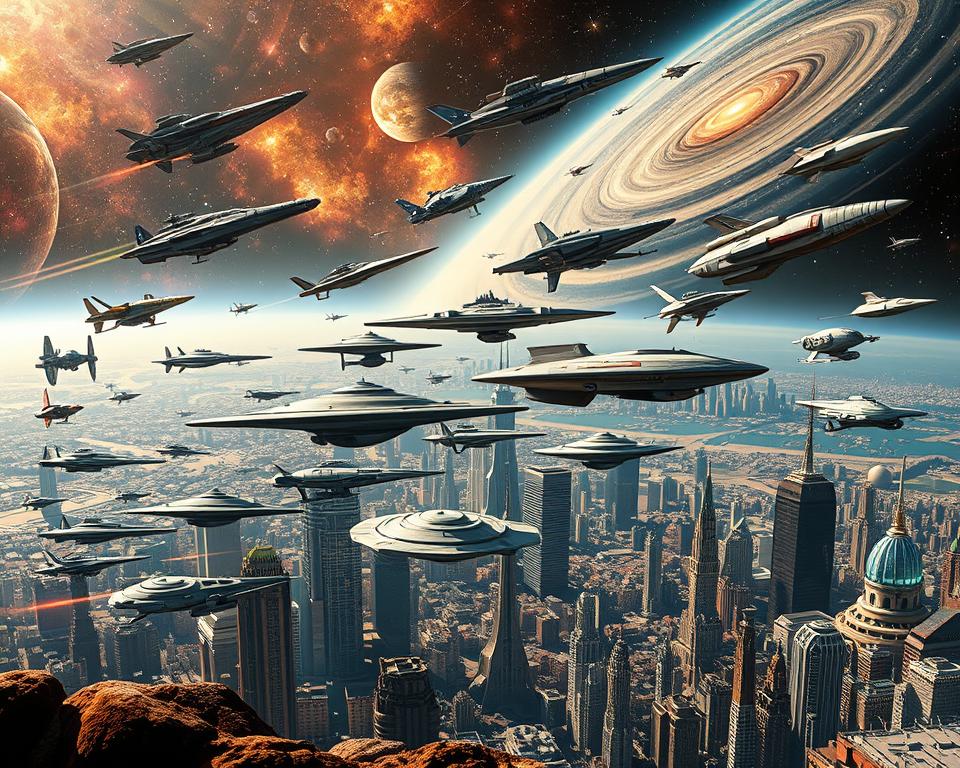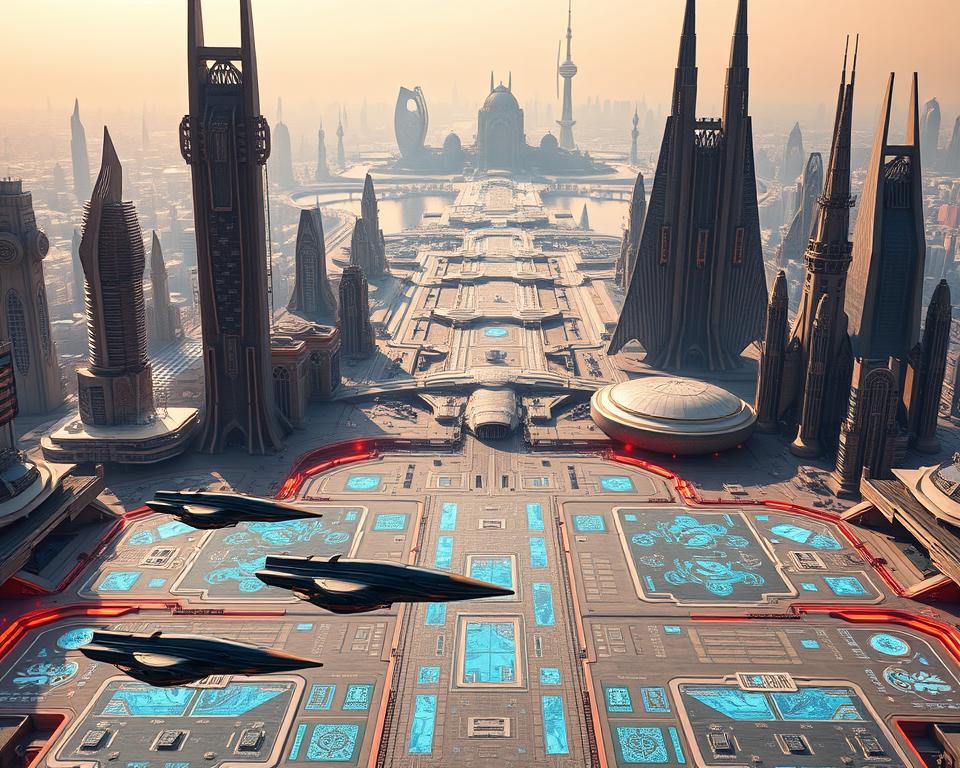Announcement
You science fiction universes reflect our dreams and fears. The cinema shows us alternative realities that challenge our ideas. Science fiction It's not just a form of escape. It also reflects today's technological innovations and social concerns.
I'll show how these universes captivate audiences. They reveal the evolution and relevance of these themes in cinema current.
Announcement
Main Points
- Exploring the fascinating world of Science fiction node cinema.
- Reflection on technological innovations and social anxieties.
- How the classics shaped the perception of futurism.
- The evolution of the universes presented on the screens.
- The cultural and social relevance of films Science fiction.
The Fascination of Science Fiction in Cinema
THE Science fiction is one of the most fascinating genres in the cinema. It has captured the imagination of many over the years. This evolution reflects both technological advancement and humanity's social and ethical concerns.
THE cinema Science fiction blends exploration of the unknown with reflection on the present and future. This makes the genre increasingly relevant.
Announcement
The Evolution of Science Fiction Films
Early science fiction in cinema had prominent voices. "Metropolis" (1927) and "2001: A Space Odyssey" (1968) are examples. These works redefined what was possible in visual storytelling.
They also challenged perceptions of space, time, and the interplanetary. From these points on, the genre began to incorporate elements that resonated with audiences. This reflected the evolution of science fiction films.
Cultural and Social Impact
Science fiction films have a great cultural impact and social. They influence popular language and shape aesthetic trends. In many cases, they create expectations about technological innovations.
The eras covered in these notable works open up space for ethical and philosophical discussions. This makes cinema a catalyst for crucial debates in contemporary society.

| Year | Movie Title | Contributions |
|---|---|---|
| 1927 | Metropolis | Pioneer in the use of special effects and social issues. |
| 1968 | 2001: A Space Odyssey | It revolutionized visual storytelling and the concept of artificial intelligence. |
| 1977 | Star Wars | It expanded the universe of science fiction and created a global cultural phenomenon. |
| 1999 | The Matrix | It challenged notions of reality and introduced broad philosophical questions. |
Science Fiction Universes That Enchant
The mix of alternative realities and classical elements is essential in sci-fi literature and in the cinema. Those alternative universes make us question what is real. Works like "The Matrix" and "Inception" show parallels between the real and the imaginary.
The Magic of Alternate Universes
You alternative universes In science fiction, they're entertaining and thought-provoking. They present situations that demonstrate the versatility of the human condition. Complex stories force us to confront ethical and moral dilemmas.
Creative freedom is at the heart of these universes. They defy our logic and perception.
Classic Elements of Science Fiction
THE sci-fi literature is based on classical elements that captivate audiences. Time travel, exploration of the unknown, and extraterrestrial civilizations are favorites. These elements create adventure and curiosity.
Examples like "The Terminator" show how these elements can blend action and reflection. This makes for a rich and impactful cinematic experience.
| Element | Description | Examples in Films |
|---|---|---|
| Alternate Universes | Realities that diverge from ours, creating new narratives. | The Matrix, The Origin |
| Time Travel | Exploration of different time periods and their implications. | The Terminator, Back to the Future |
| Exploration of the Unknown | Discoveries in unexplored places, often on other planets. | Interstellar, The Book of Eli |
Experiments with Futurism and Advanced Technology
THE futurism in the Science fiction helps us explore our desires and fears. Cinema shows how advanced technology can change our daily lives. Films like "Blade Runner" and "Ex Machina" discuss the ethics of human interaction with intelligent machines.
These stories aren't just for fun. They make us think. By seeing future scenarios, cinema makes us question the kind of world we want. futurism helps us imagine what can come from technology, such as artificial intelligence and the virtualization of experiences.
Cinema also makes us think about our responsibility toward technological innovations. These discussions make us question reality, identity, and morality in the digital age.

Exploring Themes Such as Aliens and Time Travel
The genre of science fiction universes is fascinating. It expands our perceptions of what is possible. Topics such as aliens and time travel are essential in these engaging tales. They allow for a deep exploration of existential and ethical questions.
The Encounter with Extraterrestrial Civilizations
The meeting with aliens is one of the most intriguing themes in cinema. Films like "Close Encounters of the Third Kind" and "Arrival" don't just entertain. They also question the nature of communication between different species.
These productions make us wonder what a universal language might be. It would be capable of transcending cultural barriers. The idea of receiving messages from extraterrestrial civilizations makes us reflect on our own humanity.
It also makes us think about the possibility of coexistence in a vast and enigmatic cosmos.
Making Time Travel Attractive
THE time travel presents rich and complex narratives. This is evident in "Back to the Future" and "Looper." These stories unravel the relationship between past, present, and future.
They explore the consequences of characters' actions across different timelines. Cinema becomes a reflection of our own reality. Every decision can have significant impacts.
This diversity of narratives not only captures the imagination. It also offers a way to think about our life trajectories. And about the possibilities that arise in every moment.
Conclusion
We explore how science fiction universes in cinema are more than entertainment. They make us think about social and cultural issues. They also make us reflect on our place in the universe and the choices we make with technology.
This blend of fantasy and reality makes these films captivating. It makes us dream and imagine the unknown. It helps us see beyond what we think is possible.
THE cultural impact Science fiction is incredible. It makes us think about the ethics of technology and the future of humanity. These stories invite us to dream and push boundaries.
With new innovations in storytelling and technology, the future of science fiction cinema is promising. I look forward to seeing the new ideas and perspectives filmmakers will bring us. They will make us question the future and our existence as we explore these complex universes.

